From coup to counter-coup? Guinea plunged into chaos
With military leader recovering in Morocco after a gun attack, the African state nervously awaits next chapter in its turbulent history

Your support helps us to tell the story
From reproductive rights to climate change to Big Tech, The Independent is on the ground when the story is developing. Whether it's investigating the financials of Elon Musk's pro-Trump PAC or producing our latest documentary, 'The A Word', which shines a light on the American women fighting for reproductive rights, we know how important it is to parse out the facts from the messaging.
At such a critical moment in US history, we need reporters on the ground. Your donation allows us to keep sending journalists to speak to both sides of the story.
The Independent is trusted by Americans across the entire political spectrum. And unlike many other quality news outlets, we choose not to lock Americans out of our reporting and analysis with paywalls. We believe quality journalism should be available to everyone, paid for by those who can afford it.
Your support makes all the difference.Guinea's military leader Moussa "Dadis" Camara was last night being treated at an army hospital in Morocco after being shot following an argument with one of his aides. Soldiers were out in force on the streets of Conakry, the capital of the West African country, amid fears of a counter-coup to topple the army major who came to power one year ago.
His sudden departure for Rabat appeared to confirm reports that he was seriously wounded. The Guinea leader has not dared to leave the country since taking over in a bloodless coup last December. Blaise Compaore, the President of Burkina Faso, last night said Camara's condition was "difficult but not desperate". Mr Compaore, who has attempted to broker an end to the political crisis in Guinea, said Camara would have to undergo an operation "because he was hit by bullets".
In scenes that recalled some of the worst power struggles of the past decade in nearby Sierra Leone and Liberia, the junior army officers who seized power last year have turned on each other in the struggle for power and to avoid international responsibility for a brutal stadium massacre in September.
Aides loyal to the army strongman were earlier insisting that he was not seriously wounded. Other witnesses claim to have seen the president bleeding from a head wound after a heated confrontation on Thursday night with Abubakar "Toumba" Diakite, the head of the presidential guard.
The presence of the pariah leader in Morocco is an embarrassment as he is under investigation by a UN team over his role in the September massacre at Conakry football stadium in which human rights groups say that at least 157 people were killed.
Camara is subject to a US and EU travel ban, while he has been ostracised by the African Union and the regional trading bloc Ecowas after reneging on earlier promises to step down and hold elections. The Moroccan foreign office insisted he was being treated on "strictly humanitarian grounds".
Thursday night's shooting followed a falling out between Camara and "Toumba" Diakite, with the latter believing he will be made the scapegoat for the stadium massacre. Officials loyal to the young military ruler were desperately attempting to refute reports he had been seriously wounded. "He had an audience with us just before leaving ... Everything is under control," said the Communication minister Idrissa Cherif.
Independent analysts said it was highly unlikely the president would have left the country unless his life was in danger. Toumba and Camara argued while at a military camp housing hundreds of men under Toumba's control, according to officials loyal to Camara.
The impoverished former French colony has been in a state of constant upheaval since the death of the long-time dictator Lansana Conte. The young major was initially welcomed after he and a small clique of officers from Guinea's indisciplined army announced themselves by breaking through the doors at the main television station to declare they had seized power.
Camara's early promises to root out corruption, stand down and hand power to a civilian government after democratic elections were quickly broken.
He is said by analysts to have become "intoxicated" by power and is known to have larger than life portraits of himself displayed in his office. He has taken to broadcasting long, rambling rants on television and is known to sleep all day and only emerge at night.
Relations within the junta have been strained by the September massacre that drew worldwide condemnation.
Demonstrations that grew out of popular anger at the prospect of another military dictator filling the void left by the brutal Conte regime were met with a murderous response on 28 September. Hundreds of protesters rallied at Conakry sports stadium to hear opposition leaders. The presidential guard, commanded by Toumba, opened fire, killing more than 150 people. Dozens of women were raped by soldiers inside the stadium and 20 women were kidnapped and videotaped being raped and tortured for several days, according to survivors' testimony.
A UN mission has been in Conakry this week conducting an investigation into the massacre which could lead to charges being brought for crimes against humanity by the International Criminal Court.
Join our commenting forum
Join thought-provoking conversations, follow other Independent readers and see their replies
Comments